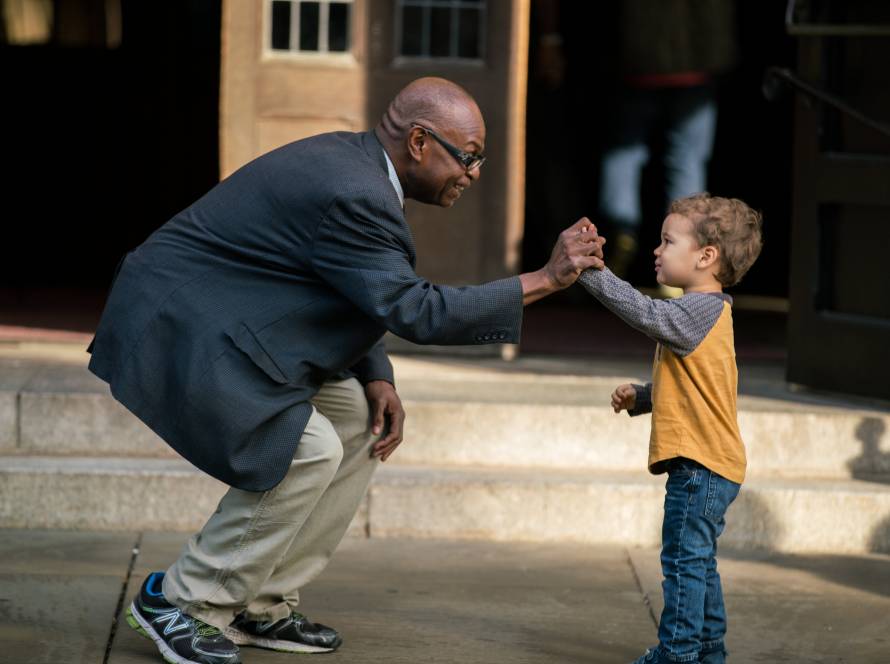This week, the buzz about Shiny Happy People, a docuseries about the Duggar family of TLC’s 19 & Counting, has taken over my social media feed. And with good reason. The story that unfolds is one that causes a wide-range of emotions from anger to sadness to disbelief. I have watched it and would honestly encourage others to as well. Why? Not necessarily for the Duggar’s story; that can be found in the news or, if you’re really up for it, public court records. Not necessarily for the expose on Bill Gothard and his Institutes and cult following. Not even because it’s the current hot show to tune into.

My biggest reason for encouraging you to watch it is to hear how the term “Christian” gets used in the series.
The word Christian literally means “follow of Christ” or “little Christ.” Christ is translated as “Anointed One” so the most literal translation we can come up with is “little anointed ones.” That’s the label that was given to the early church, not by themselves, but by others who saw how they were living and determined that their behavior, actions, and teachings designated them as followers of Christ, imitators of Jesus, little anointed ones.
That is not how the word is used today. In fact, in the docuseries, the term “Christian” was not used very often to describe a person but rather to describe a movement, a teaching, a belief, or an understanding. And it was not used to described these things as they mirrored Christ but rather as they pertained to a religion. If the Bible was used and Jesus was mentioned, in any context, even if it looked nothing like Christ, it was given the description of “Christian.”
As someone who considers herself a Christian and someone who takes seriously the call to “make disciples” and to help others to be followers of Christ, every time the term was used to describe the teachings and actions taken by those mentioned in the docuseries, I winced. Because I have raised my children to understand Christian to mean something very different but when they hear that word used in the context of the show, they have a hard time separating the two.
Parents, it is important, so important, that we teach our children that just because something is labeled as Christian and uses Bible verses and talks about Jesus, DOES NOT MEAN THAT IT IS CHRISTIAN. And, just because the truth gets mixed in with bad teaching, spiritual abuse, and incorrect doctrine doesn’t mean all Christian teaching is bad, abusive, and incorrect.
We must help our children make the distinction between was is Christlike and what is “Christian” by the standards of the day. I am convinced more and more that if we do not make Jesus central to our faith and help our children read Scripture and hear teaching through the lens of Christ, they will fall prey to the “Christian” understanding of the day and either reject Christ because of it or accept poor doctrine in light of it. Theologian N. T. Wright puts it this way:
“If you want to know who God is, look at Jesus. If you want to know what it means to be human, look at Jesus. If you want to know what love is, look at Jesus. If you want to know what grief is, look at Jesus. And go on looking until you’re not just a spectator, but you’re actually part of the drama that has him as the central character.”
N. T. Wright
In Colossians, Paul makes it very clear that our message is Jesus. He says, “We tell others about Christ, warning everyone and teaching everyone with all the wisdom God has given us.” Another version says, “We preach Christ.” Peter’s first sermon in Acts is all about Jesus.
The Church’s message is first and foremost, Jesus is Lord, the Anointed One.
That is the gospel and that is our message. As parents and ministers, let’s make it our goal to live a quiet life, minding our own business and working with our hands. Then people, including your own children, who are not believers will respect the way you live and may even ask why you have hope in this not-so-shiny, not-so-happy world (1 Thessalonians 4:11,12)
And our answer can be, “Jesus.”
Summer is the Time to Connect!
Special offer for churches ready to build a discipling community.
Connect Generations, a ministry assessment tool that can be done by a church in less than a week that offers specific insight into the barriers and bridges to connect generations and bring your community together.
We’re so convinced that this tool will transform discipleship in your church, we are offering a SPECIAL promotional offer for the summer. Use the code CONNECTSUM to get 25% off your Connect Generations Ministry Assessment Tool including personalized feedback and a FREE 30 minute coaching session.
About the Author

Christina Embree is the founder and director of ReFocus Ministry. She holds a masters in ministry focused on Children, Youth, and Family Ministry and a doctorate in spiritual formation with a focus on age segregation and intergenerational ministry. In addition to coaching churches of multiple denominations and traditions all around the globe, Christina serves as the Minister of Generational Discipleship for the Great Lakes Conference of the Brethren in Christ and as a pastor at Plowshares Brethren in Christ in Lexington, Kentucky. She is widely recognized as a speaker and author in the areas of generational discipleship, intergenerational ministry, and family ministry. As the mother of three children, she is familiar with the challenges of faith at home and pastoral ministry. She along with her husband Luke share a love for the church, their community, and the global work of peace and restoration through Jesus.



